5 of us volunteers from Adra climbed into our little Pajero and headed east to the Indian ocean for a few days over New Years eve. It is meant to be a 6 hour drive, but the drive between Arusha and Moshi which is a smaller town 60 km due east took about 2 hours. There were police out in front of every little village stopping virtually every one. There are many villages between Arusha and Moshi. This is their high season and they can supplement their salaries with a lot by stopping and finding things wrong with people’s vehicles then taking unreceipted fines!. We got stopped for not having a copy of the vehicle registration on us. Then we got stopped for not having a ‘fire sticker’. Not having heard of this we ask what is a fire sticker. He points us to a guy sitting in a fire truck donated by the Japanese. Apparently every vehicle is meant to pass a ‘fire certification’ then gets a sticker to put on the windshield. Naturally they don’t have any stickers left but we still have to pay, then with his written temporary receipt, then drive into the government office in Moshi to get an official government receipt to say we had paid for this inspection. No one ever inspected the truck. The government guy in Moshi had no stickers either, he said try again late January. While in Moshi we filled up with fuel and when I opened the petrol cap a wasp flew out and stung my hand. Ouch, it swelled up a bit for three days. That was a lot of drama in 2 hours!
Anyway we get to Pangani with no further incident at about 3 pm after the last 42 km along a dirt road. We checked into the Tinga-Tinga lodge. It is quite basic and rustic on a cliff top overlooking the blue ocean. Very pretty. It is a lot hotter there than Arusha so we quickly head down the steps to the ocean. The water is very warm and fantastic for swimming and just floating about it. Very nice. Dinner is in an open air restaurant with seafood dishes. The full moon is shining on the water in between the palm trees. The next day was New Years eve. We drove to Pangani town itself and walked along the dilapidated water front. It used to be a popular trading center in the early days but has been neglected for about 100 years and so most of the early European style stone buildings are in various stages of decay and collapse. They still have some nostalgic charm. The town got its infamous name from the Swahili verb ‘panga’ which is to arrange. It was a slave trading town and the selling broker would call out ‘Panga Panga’ to get the slaves arranged in a line to be sold. Over the years it became Pangani. New Years eve was with about 30 guests at the lodge, all international travellers of some sort. The lodge put on a special buffet. After eating we moved just outside on to the grass on the cliff top where it was a little cooler. The evening passed quickly with talking to other people, where they came from, why they were in Tanzania. At midnight, out came the champagne for a New Years toast.
New Years day after a morning swim, the lodge manager said he would take us for a walk up the beach to a special beach where there were giant Clam fossils in the sandy cliffs. We were into this with excitement. Taking our swimming gear and water bottle we headed off north around the next bay. Tucked in behind some mangroves was this sandy beach with a 7 m sandy cliff above it. Sure enough there were many of these fossils. Millions of years old they had been calcified and were very heavy. Some almost complete shells and some broken ones. Some protruding just a little suggestively bit from the sand ,others lying exposed on the sand. With storms and high tides they get reburied and others get exposed all the time he said. These shells are about 2 ft (0.6 m) across. Ramona had her picture taken sitting in one. On the way back instead of walking back around the bay I swam across it while Ramona carried our gear. The water is so warm and inviting. The next day after a morning swim we left with fond memories of this secluded beach town.
Subscribe to:
Post Comments (Atom)
































































































































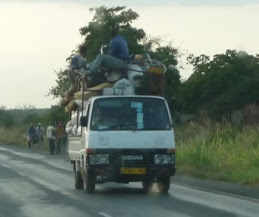





























































































































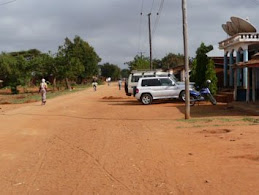

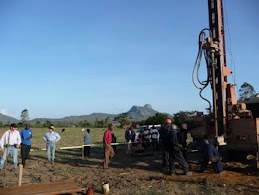


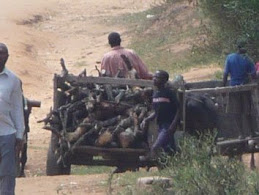
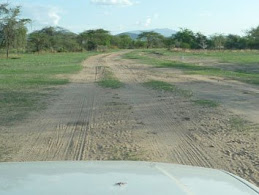























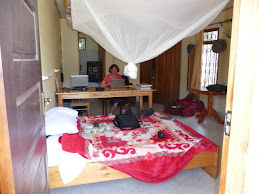

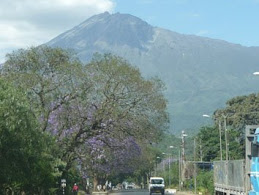
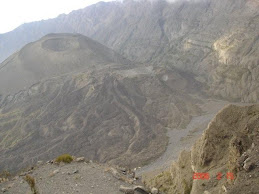
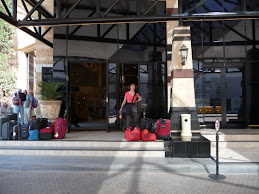
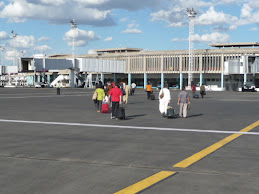
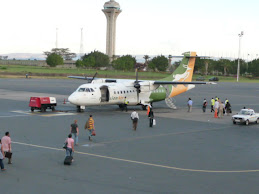
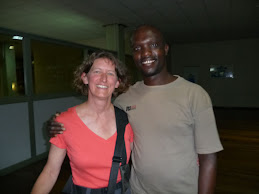
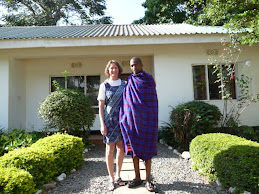
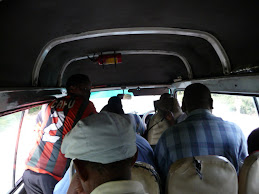


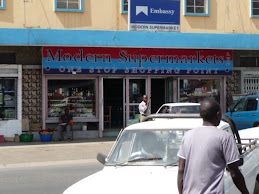





No comments:
Post a Comment